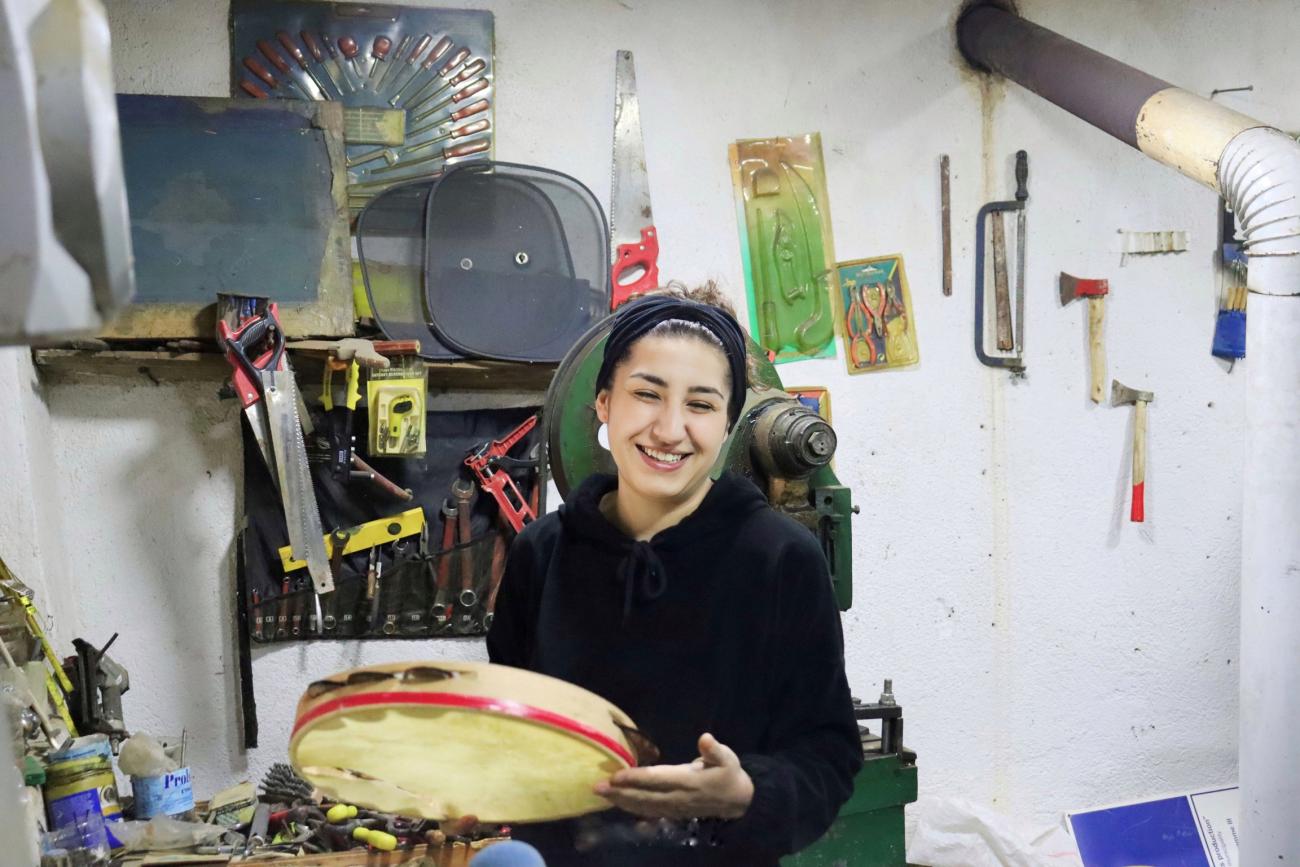In Our Family We Say, ‘Like Father, Like Daughter’

Have you ever been to a Roma wedding or celebration? If not, you’re missing out on perhaps the best party ever.
Have you ever been to a Roma wedding or celebration? If not, you’re missing out on perhaps the best party ever.
The lively and cheerful musical tones at Roma parties bring vibrant colour to the celebration rooms, and there’s no sitting—you’re carried away by the atmosphere, unaware that you’ve started to dance. Amidst the festivities, the sound of the tambourine somehow stands out, its beautiful music often being played by women.
In this story, we bring you along to a small shop, owned by a local Roma family, where these tambourines are produced.
In the beautiful, old Kosovo village of Janjevë/Janjevo, with its multicultural community that includes Croatian, Albanian, Turkish and Romani people living in harmony, tradition meets innovation. Sali Gashi (43), a local tambourine producer, was born in this village and lives here with his wife, two daughters and a son. He inherited the skill of making tambourines from his father and he’s now, in turn, proudly handing it down to his children.
.jpg?auto=webp)
.jpg?auto=webp)
His eldest daughter, Nadja (21), is very keen to continue the family business, together with her younger brother. “People say, ‘Like mother, like daughter,’ but I’m proud to transfer my knowledge to my daughter, so in our family we say, ‘Like father, like daughter,’” Sali emphasises, proudly.
He explains that he makes the percussion instrument, which has a shallow drum and small metal disks around the edge, with goat skin, metal and plastic. “When you hit and move it with your hands, a beautiful sound comes out,” he says.
His customers are from all over the Balkans, but most orders come from the Albanian community in Kosovo. “People interested in traditional music know about me and how good I am at making tambourines,” he says. “Just ask for Sali Gashi, and everyone will know about me.”
Nadja is no less talented. Besides using her skills in the tambourine-making business, she also works as a professional cook at one of the most popular restaurants in central Kosovo. But she says she’s uncertain about the future of the craft that has been passed down in her family through the generations.
.jpeg?auto=webp)
.jpeg?auto=webp)
“I’m not sure I see my future in this business, because we receive orders only during the summer, in the wedding season, when we produce around 200 tambourines per month. The rest of the time, we produce metal twisters for hair,” she explains. “The pandemic hit the Romani community hard, but I see that other communities are also in the same situation. Living off any craft seems like the way out of this economic crisis. We need help to expand this business, so I hope for better times.”
With a smile etched across her face, Nadja seems like a happy young woman, aspiring to find new prospects. “We need more opportunities and more initiatives for the revival of Janjevë/Janjevo—to use the unique natural beauty of the village, so that we can reopen and re-start our businesses. We’re close to the capital, so people can easily come and enjoy our natural and cultural riches,” she says.
.jpeg?auto=webp)
.jpeg?auto=webp)
With her talent, energy and the support of the community, Nadja has the prospects to take her family business to new heights, pursue new opportunities and help bring prosperity to her village.
Fortunately, there’s a project with a focus on safeguarding and restoring cultural heritage sites, while also fostering economic growth through tourism. Titled ‘Cultural Heritage as a Driver for Economic Revival of Janjevë/Janjevo,’ it’s funded by the European Union Office in Kosovo (through IPA II) and the Ministry of Culture, Youth and Sport and implemented by UNDP.
.jpg?auto=webp)
.jpg?auto=webp)
Story by: Valbona Shujaku and Danijela Mitic
Photo credit: Enis Mustafa and Arben Llapashtica for UNDP Kosovo
Story edited by: Jack Butcher for UNDP Kosovo


